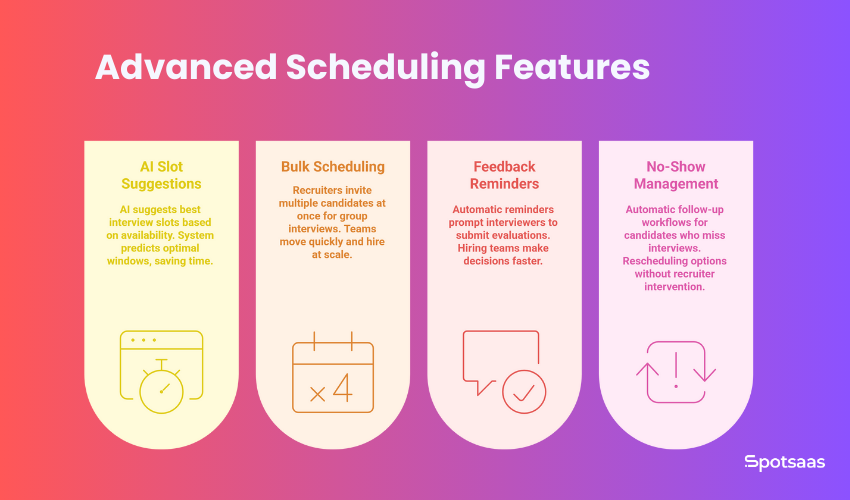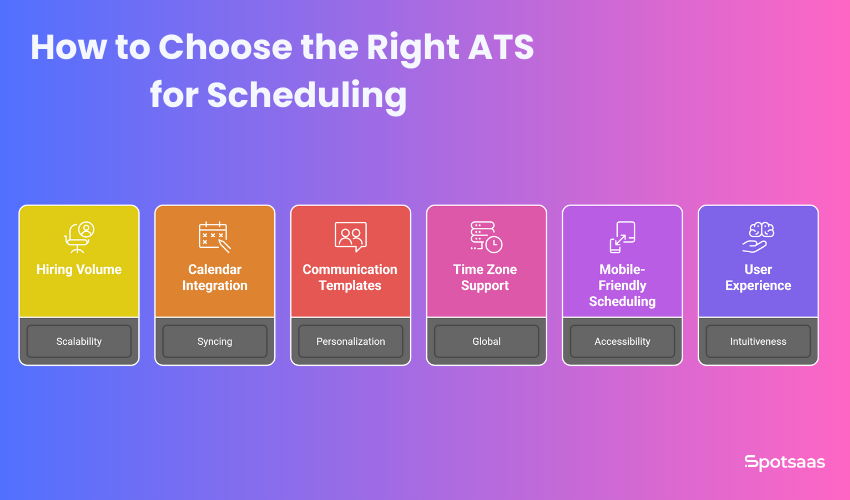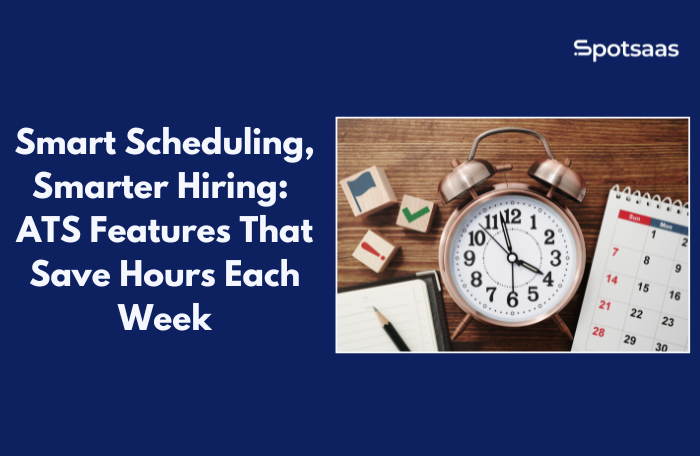Smart scheduling has become a game-changer for hiring teams aiming to move faster and stay organized. In a process where every minute counts, manual scheduling still takes up a surprising amount of time — from endless email threads to last-minute rescheduling.
Recruiters and hiring managers often find themselves spending valuable hours coordinating calendars, setting up interviews, and sending reminders. While these tasks are essential, they can also slow down the momentum needed to secure top talent.
Today, many teams are turning to Applicant Tracking Systems (ATS), which are equipped with smart scheduling features. These tools automate the scheduling process, helping recruiters save time, reduce manual effort, and create a better experience for candidates.
What This Blog Covers
In this guide, you’ll find:
- Key reasons why scheduling bottlenecks slow down hiring
- Smart scheduling features to look for in an ATS
- Advanced tools that make interview coordination easier
- Common mistakes to avoid when setting up scheduling workflows
- A quick comparison of top ATS platforms with smart scheduling
- Practical tips to choose the right ATS for your team
- Future trends shaping smart scheduling in hiring
- Frequently asked questions about smart interview scheduling
Why Scheduling Bottlenecks Hurt Hiring
Recruiting teams work hard to build a strong candidate pipeline, but small delays in scheduling can create bigger problems than expected. Without smart scheduling tools, these everyday hurdles can slow down the entire hiring stack and leave a lasting impression on candidates. Here’s where most bottlenecks happen:
Manual Follow-Ups
Chasing emails and calendar updates wastes recruiter time.
Candidate No-Shows
Missed interviews cause delays and extra work.
Cross-Time-Zone Confusion
Poor time zone management risks losing great candidates.
Interviewer Coordination
Finding common slots delays interviews and slows hiring.
Manual Follow-Ups
In many organizations, recruiters still spend a large part of their day manually following up with candidates and hiring managers to coordinate interview times. In contrast, it may seem like a simple task, but chasing confirmations, adjusting calendars, and dealing with last-minute changes can quickly eat into productive hours.
This lost time could have been better spent building relationships, sourcing candidates, or making quicker hiring decisions.
Candidate No-Shows
When interview scheduling is not automated, reminders often get missed. Candidates may forget about their interviews or face confusion about timings, especially if the details are shared over multiple emails.
No-shows not only delay the hiring process but also force recruiters to restart parts of their hiring workflow, creating unnecessary work and frustration for everyone involved.
Cross-Time-Zone Confusion
Hiring across cities or countries brings incredible opportunities—but also new challenges. Without a scheduling system that adjusts for time zones automatically, recruiters risk setting up interviews at inconvenient times.
This can lead to missed opportunities with high-potential candidates who expect a seamless and respectful experience when engaging with a potential employer.
Interviewer Coordination Issues
Coordinating the calendars of multiple interviewers is often more complicated than managing candidate schedules. With busy internal teams, finding a shared time slot can delay interviews for days or even weeks.
These delays not only slow down hiring but can make candidates feel disconnected or undervalued, impacting their decision to accept an offer later.
By recognizing and solving these scheduling bottlenecks early, companies can move faster, provide a better candidate experience, and improve the efficiency of their hiring teams.
Key Smart Scheduling Features to Look For
Choosing an Applicant Tracking System with strong scheduling features can transform the speed and quality of your hiring stack. Here are the must-have capabilities to look for when evaluating your options:
| Feature | Why It Matters |
|---|---|
| Self-Scheduling | Candidates choose and reschedule slots easily, saving recruiter time. |
| Automated Invites & Reminders | Reduces no-shows and builds trust with timely updates. |
| Calendar Integration | Prevents conflicts and speeds up scheduling with real-time syncing. |
| Time Zone Adjustments | Auto-adjusts interview times for global candidates. |
| Panel Interview Scheduling | Finds common availability across multiple interviewers quickly. |
| Interview Types Management | Manages phone, video, in-person, and multi-stage interviews easily. |
Self-Scheduling and Rescheduling by Candidates
One of the most powerful features in a smart hiring ATS is giving candidates control over their interview times. Self-scheduling links allow candidates to choose an available slot that works for them, based on the interviewers’ real-time availability.
If something changes, candidates can easily reschedule on their own without a long email chain. This level of flexibility not only saves time but also shows candidates that their convenience matters.
Automated Interview Invites and Reminders
Automated communication tools within the ATS ensure that candidates receive clear invites and timely reminders. Whether through email or SMS, these triggers help candidates stay informed and prepared for their interviews.
Sending reminders automatically reduces missed interviews and keeps the hiring timeline on track without requiring manual follow-ups from recruiters. It also adds a layer of professionalism to your hiring stack, building better trust with candidates.
Calendar Integration
A good scheduling system should connect seamlessly with popular calendar platforms like Google Calendar, Outlook, and others. One-click syncing helps recruiters and interviewers manage their availability easily, while real-time updates prevent double-booking and scheduling conflicts.
With everything in one place, interview planning becomes more organized and efficient. This simple integration can make daily operations faster and more error-free for busy hiring teams.
Time Zone Adjustments
For companies hiring across different regions, time zone management is a must. A smart ATS automatically detects the candidate’s location and adjusts interview times accordingly.
This eliminates confusion, prevents scheduling errors, and ensures a professional experience, especially when working with remote hiring. By handling time differences automatically, recruiters can focus fully on engaging with candidates.
Panel Interview Scheduling
When multiple team members need to participate in interviews, finding a common time slot can become a challenge. Smart scheduling features help by suggesting available windows where all participants are free.
This capability speeds up the process of setting up panel interviews, which is often a bottleneck for final-stage hiring. A well-organized panel interview shows candidates that your team values collaboration and preparation.
Interview Types Management
Different roles require different types of interviews — phone screens, video calls, in-person meetings, or even multi-stage assessments. A strong ATS makes it easy to manage and schedule all sorts of interviews from a single dashboard.
This flexibility helps recruiters organize their hiring workflows based on the specific needs of each position. Managing different interview types smoothly gives candidates a consistent, positive experience from start to finish.
Advanced Scheduling Features
While core scheduling features are essential, some advanced capabilities can take your hiring process even further. These additions help recruiters manage high-volume hiring, gather better feedback, and stay proactive throughout the hiring journey. Here are a few features that can make a real difference:

AI-Based Interview Slot Suggestions
Some modern ATS platforms leverage AI in ATS to suggest the best possible interview slots by analyzing recruiter and candidate availability. Rather than manually checking calendars, the system predicts optimal time windows, saving time and reducing scheduling friction. This not only accelerates the hiring process but also ensures a smoother, more consistent experience for all parties.
Bulk Scheduling for High-Volume Hiring
When dealing with job fairs, campus drives, or seasonal hiring, setting up hundreds of interviews individually isn’t practical. Bulk scheduling features allow recruiters to invite multiple candidates at once and manage group interviews efficiently.
This capability becomes a real advantage when teams need to move quickly and hire at scale without compromising on candidate experience.
Interview Feedback Reminders
Getting timely feedback from interviewers can be a challenge, especially in fast-paced environments. Smart ATS platforms can send automatic reminders to interviewers after each meeting, prompting them to submit their evaluations.
By keeping feedback loops tight, hiring teams can make decisions faster and maintain strong momentum throughout the process.
No-Show Management
Despite best efforts, no-shows occasionally happen. Advanced scheduling systems offer automatic follow-up workflows for candidates who miss their interviews.
They send polite rescheduling options without needing recruiter intervention. This proactive approach keeps candidates engaged and minimizes delays, giving recruiters more control over the overall timeline.
Popular ATS Platforms with Smart Scheduling Features
| ATS Platform | Key Scheduling Strength | Pricing |
|---|---|---|
| Ashby | Advanced calendar syncing and smart conflict detection. | Starts from $300+/month (custom quotes) |
| Recruitee | Easy self-scheduling links for candidates to pick slots. | From $199/month (Launch plan) |
| Lever | Automated invites, reminders, and confirmations. | Custom pricing (based on team size) |
| Greenhouse | Strong calendar and timezone integration for global hiring. | Custom pricing (quote-based) |
| Workable | Simple one-click scheduling with flexible rescheduling options. | From $149/month (Starter plan) |
How Smart Scheduling Improves Hiring Outcomes
Investing in intelligent scheduling isn’t just about saving time — it brings real, measurable improvements in the cross-functional hiring process. Here’s how the right ATS scheduling features can make an impact:
- Faster Time-to-Hire – Smart scheduling removes the back-and-forth typically involved in interview coordination. With candidates able to pick their slots instantly and reminders keeping everyone on track, hiring teams can move candidates through the funnel much faster.
- Better Candidate Communication – Automated invites, confirmations, and reminders create a smooth, professional experience for candidates. Clear communication at every step helps candidates feel more confident and connected throughout the hiring process.
- Reduced Manual Admin Work for Recruiters – Recruiters no longer have to spend hours juggling calendars or chasing confirmations. Innovative scheduling tools handle the routine tasks, freeing up recruiters’ time to focus on more strategic work like sourcing and relationship building.
- Higher Acceptance Rates – When candidates experience a well-organized, responsive hiring process, it leaves a positive impression. A smooth journey from application to interview increases the likelihood of offer acceptance, especially when candidates are considering multiple opportunities.
- Better Employer Branding – Every touchpoint in the hiring process shapes how candidates view the company. A seamless, respectful, and efficient scheduling experience sends a strong message about the organization’s culture, boosting its reputation as a great place to work.
Common Mistakes to Avoid When Implementing Smart Scheduling
Adding smart scheduling features to your hiring process can be a major advantage, but small missteps during setup can limit the benefits. Being aware of these common mistakes helps teams get the most out of their new ATS investment:
Not Syncing Calendars
Without proper calendar sync, double bookings happen.
Always verify integrations during setup.
Using Default Templates
Generic messages feel impersonal.
Customize templates to match your brand voice.
Skipping Mobile Optimization
If scheduling isn’t mobile-friendly, candidates may drop off.
Choose an ATS that works seamlessly on phones.
Not Syncing Recruiter Calendars Properly
After setting up an ATS, one of the first steps is connecting the recruiter and interviewer calendars. If this isn’t done correctly, interviewers may show as available when they are not, leading to double-bookings or missed meetings.
Taking a few extra minutes to verify calendar integrations ensures a smoother scheduling experience from the start.
Not Customizing Communication Templates
Many ATS platforms come with ready-to-use email and SMS templates for invites and reminders. While convenient, using them without adjustments can make communication feel generic.
Personalizing templates to match your brand voice helps create a stronger connection with candidates and sets the right tone for the relationship ahead.
Ignoring Mobile Accessibility
Today’s hiring happens everywhere — on laptops, tablets, and phones. If your scheduling process isn’t easy to navigate on mobile devices, candidates may struggle to confirm or adjust their interviews.
Choosing an ATS that offers mobile-friendly scheduling keeps the process simple and accessible for busy candidates.
How to Choose the Right ATS for Scheduling
Choosing the right ATS with smart scheduling features can have a big impact on the success of your hiring efforts. It’s not just about automating a few tasks — it’s about finding a solution that fits your team’s workflow, supports candidate engagement, and keeps hiring momentum strong.

Here’s a quick checklist to help guide your decision:
Fits Your Current Hiring Volume
Before investing, it’s important to match the ATS to the size and pace of your hiring needs. Some platforms are ideal for small teams with steady hiring, while others are built for fast-scaling businesses managing dozens of open roles at once.
Choosing a tool that scales with your high-volume hiring ensures you won’t outgrow the system too quickly. It’s easier to grow with a system that already supports both small and large hiring demands.
Easy Calendar Integrations
Smart scheduling depends on seamless calendar syncing. Make sure the ATS integrates easily with tools your team already uses, like Google Calendar, Outlook, or Office 365.
Smooth calendar integration reduces conflicts, eliminates double-bookings, and speeds up the interview scheduling process. A strong integration also helps hiring managers stay in sync without needing extra reminders.
Customizable Candidate Communication Templates
Personalized communication leaves a lasting impression on candidates. Look for an ATS that lets you customize interview invites, reminders, and follow-up messages.
Well-crafted templates help create a consistent candidate experience that reflects your company’s values and professionalism. Branded, thoughtful messaging makes your hiring process feel more engaging and welcoming.
Global Hiring (Multi-Time Zone) Support
If your team is doing multi-country hiring, time zone management becomes critical. Choose a platform that automatically adjusts interview scheduling based on candidate locations.
This feature removes guesswork and keeps international hiring processes smooth and respectful of candidate availability. It also shows candidates that your team is organized and ready to support flexible, remote work setups.
Mobile-Friendly Scheduling
Today’s candidates expect flexibility, and that includes managing their interviews on mobile devices. Your ATS should offer a mobile-optimized experience for both candidates and recruiters.
Mobile-friendly scheduling ensures candidates can confirm, reschedule, or get reminders no matter where they are. In today’s structured hiring environment, mobile convenience often influences a candidate’s impression of your company.
Good Candidate and Interviewer UX
A smart ATS should feel easy, not complicated. Make sure the scheduling experience is intuitive for both candidates and internal teams.
Good UX leads to faster scheduling, fewer mistakes, and a better overall impression of your hiring process. When interviewers enjoy using the platform, it naturally leads to better team collaboration and faster decision-making.
Future of Smart Scheduling in Hiring
Smart scheduling has already changed the way hiring teams manage interviews, but the next wave of innovation is even more exciting. New advancements are making the process faster, more personalized, and even more efficient. Here’s a look at where smart scheduling is headed:
AI-Driven Slot Optimization
Future ATS platforms will suggest balanced interview times based on recruiter workload, helping teams stay focused and efficient without back-to-back scheduling.
Chatbot Scheduling Assistants
Integrated chatbots will allow candidates to instantly book, reschedule, or ask scheduling questions, making interview setup faster and more interactive.
Predictive Rescheduling with Engagement Signals
Smart systems will predict no-shows by tracking candidate engagement, offering new interview slots proactively to maintain hiring momentum.
AI-Driven Slot Optimization Based on Recruiter Workload
In the future, AI features won’t just match available times—they’ll intelligently suggest optimal interview slots based on recruiter workload and team availability. Rather than stacking back-to-back interviews, the system will create balanced schedules that help recruiters stay focused and productive.
This kind of smart optimization will enhance decision-making and improve hiring speed while reducing the risk of burnout.
Chatbot Scheduling Assistants Integrated into ATS Platforms
Chatbots are set to play a bigger role inside ATS platforms by handling real-time scheduling conversations with candidates. Instead of waiting for an email, candidates will be able to pick interview slots, reschedule, or ask basic questions instantly through a conversational assistant.
This faster, more interactive approach creates a smoother candidate experience while saving recruiters valuable time.
Predictive Rescheduling Using Candidate Engagement Signals
Future ATS platforms will be able to detect early signs that a candidate might miss or need to reschedule an interview, based on engagement signals like delayed responses or changes in activity.
Instead of reacting to missed interviews, the system will proactively suggest new time slots and help recruiters stay ahead of potential delays. This predictive capability will keep hiring pipelines flowing more smoothly and help close top candidates faster.
Conclusion
Smart scheduling has quickly moved from being a helpful feature to a core part of successful hiring strategies. By removing the manual steps that slow teams down, it delivers faster results, smoother communication, and a better overall experience for candidates and recruiters alike.
Choosing the right Applicant Tracking System with strong scheduling capabilities can save hours every week, freeing up your team to focus on building great connections and making stronger hires. It’s not just about filling roles faster; it’s about creating a process that reflects the way modern companies want to work and grow.
If you’re ready to see how the right ATS can simplify your hiring journey, now is a great time to explore available solutions. A smarter, more efficient scheduling process could be just one decision away.
Explore Top-Rated ATS Tools on SpotSaaS and find the right fit for your hiring goals.
Not sure which one suits your workflow?
Schedule a free consultation with our software advisors and get personalized recommendations for your agency.
Frequently Asked Questions
What is smart scheduling in an ATS?
Smart scheduling automates interview booking, reminders, and calendar syncing to save time and reduce manual work.
How does self-scheduling improve candidate experience?
It lets candidates pick interview times easily, making the process faster and more flexible for them.
Can smart scheduling handle different time zones automatically?
Yes, most smart ATS platforms adjust interview times based on candidate locations.
Does smart scheduling reduce interview no-shows?
Yes, automated reminders help keep candidates informed and significantly lower no-show rates.
Is smart scheduling useful for small hiring teams?
Absolutely, it streamlines coordination and helps small teams move faster without extra admin work.





